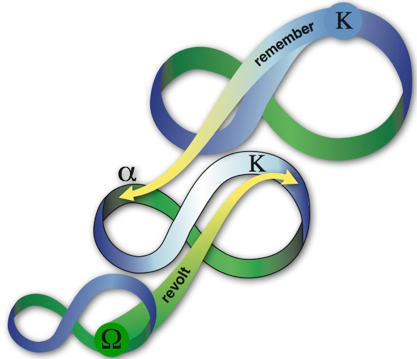


![]()
Panarchy is the structure in which systems, including those of nature (e.g., forests) and of humans (e.g., capitalism), as well as combined human-natural systems (e.g., institutions that govern natural resource use such as the Forest Service), are interlinked in continual adaptive cycles of growth, accumulation, restructuring, and renewal. These transformational cycles take place at scales ranging from a drop of water to the biosphere, over periods from days to geologic epochs
![]()
Panarchy places great emphasis on the interconnectedness of levels, between the smallest and the largest, and the fastest and slowest. The large, slow cycles set the conditions for the smaller, faster cycles to operate. But the small, fast cycles can also have an impact on the larger, slower cycles. There are many possible points of interconnectedness between adjacent levels; however, two specific points are of particular interest with respect to sustainability:
“Revolt" – this occurs when fast, small events overwhelm large, slow ones, as when a small fire in a forest spreads to the crowns of trees, then to another patch, and eventually the entire forest
“Remember" – this occurs when the potential accumulated and stored in the larger, slow levels influences the reorganization. For example, after a forest fire the processes and resources accumulated at a larger level slow the leakage of nutrients, and options for renewal draw from the seed bank, physical structures and surrounding species that form a biotic legacy.
The fast levels invent, experiment and test; the slower levels stabilize and conserve accumulated memory of past, successful experiments. Sustainability in this framework is the capacity to create, test and maintain adaptive capability. Development becomes the process of creating, testing and maintaining opportunity.
Resilience is the capacity of an ecosystem to tolerate disturbances without collapsing into a qualitatively different state. The greater the resilience is in a particular ecosystem the more it can resist large or prolonged disturbances. If resilience is low or weakened, then smaller or briefer disturbances can push the ecosystem into a different state, where its dynamics change.
According to this model, after a disturbance, ecosystems evolve through time as ecological niches fill in (increasing connectedness), biomass accumulates (increasing potential) and more successful species outcompete less successful species (decreasing resilience). This makes ecosystems vulnerable to exogamous shocks that they cause a release of resources and a period of rapid reorganization.
Once resilience is overwhelmed and an ecosystem enters a new state, restoration can be complex, expensive, and sometimes even impossible. Research suggests that to restore some systems to their previous state requires a return to environmental conditions well before the collapse.
Resilience can be degraded by a large variety of factors which largely depend on underlying, slowly changing variables such as climate, land use, nutrient stocks, human values and policies. Resilience is a characteristic of natural systems. When resilience is weakened it is sometimes possible to restore it. Diversity is believed to be a key issue in restoring resilience – both biological and social diversity are important to the extent they contribute functional redundancy (i.e. similar services can be provided by some element in the diversity). But as biological diversity is lost, or as human systems and institutions become homogenous and rigid, then the likelihood of restoring lost resilience declines.
The ability to anticipate and plan for the future is a unique characteristic of human systems, and has the potential to increase their resilience.
![]()
![]()
Please Note: This site meshes with the long pre-existing Principia Cybernetica website (PCw). Parts of this site links to parts of PCw. Because PCw was created long ago and by other people, we used web annotations to add links from parts of PWc to this site and to add notes to PCw pages. To be able to see those links and notes, create a free Hypothes.is↗ account, log in and search for "user:CEStoicism".
